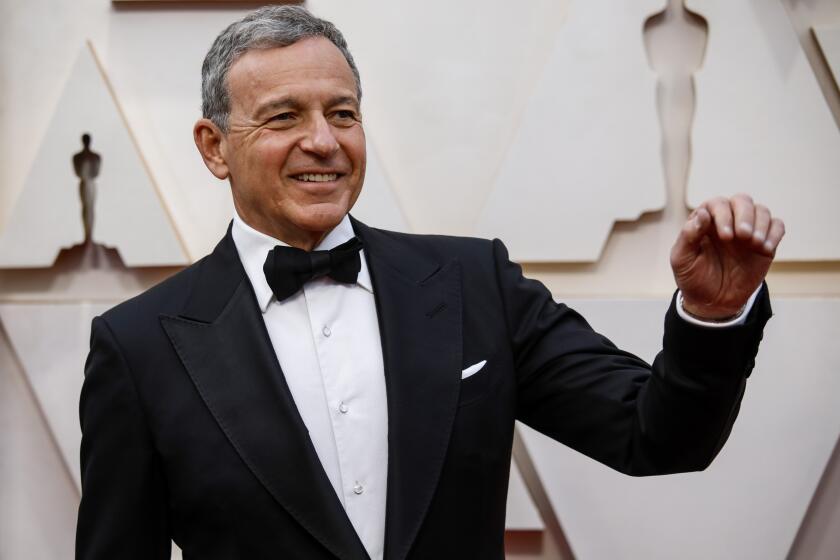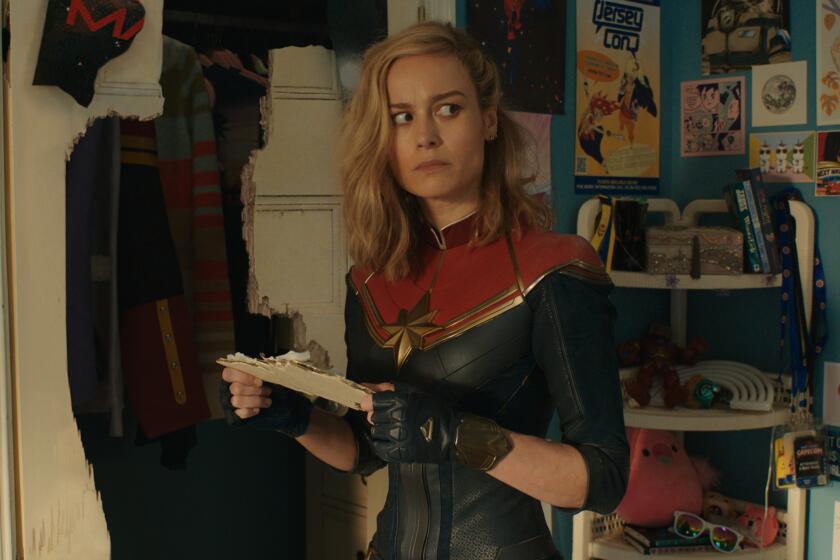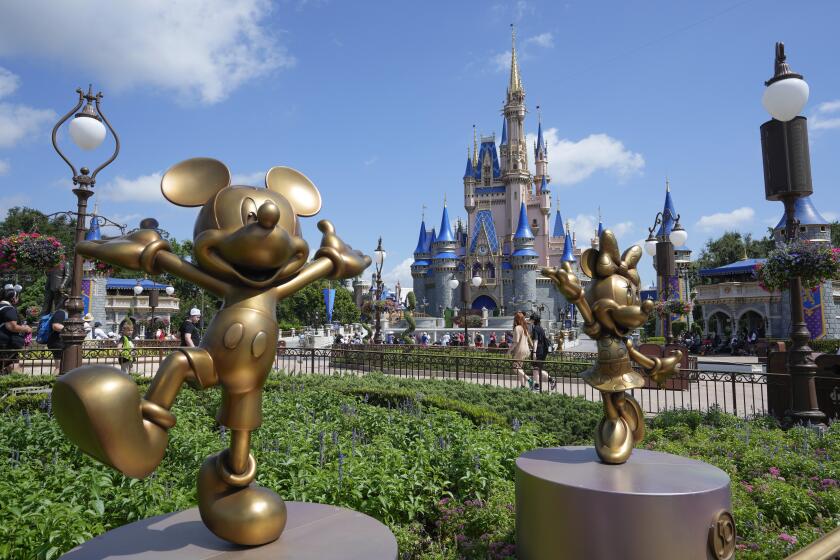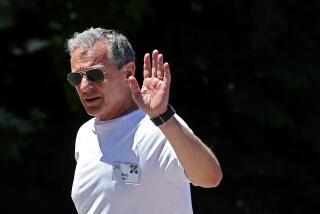The four Disney executives who could succeed Bob Iger as CEO in two years
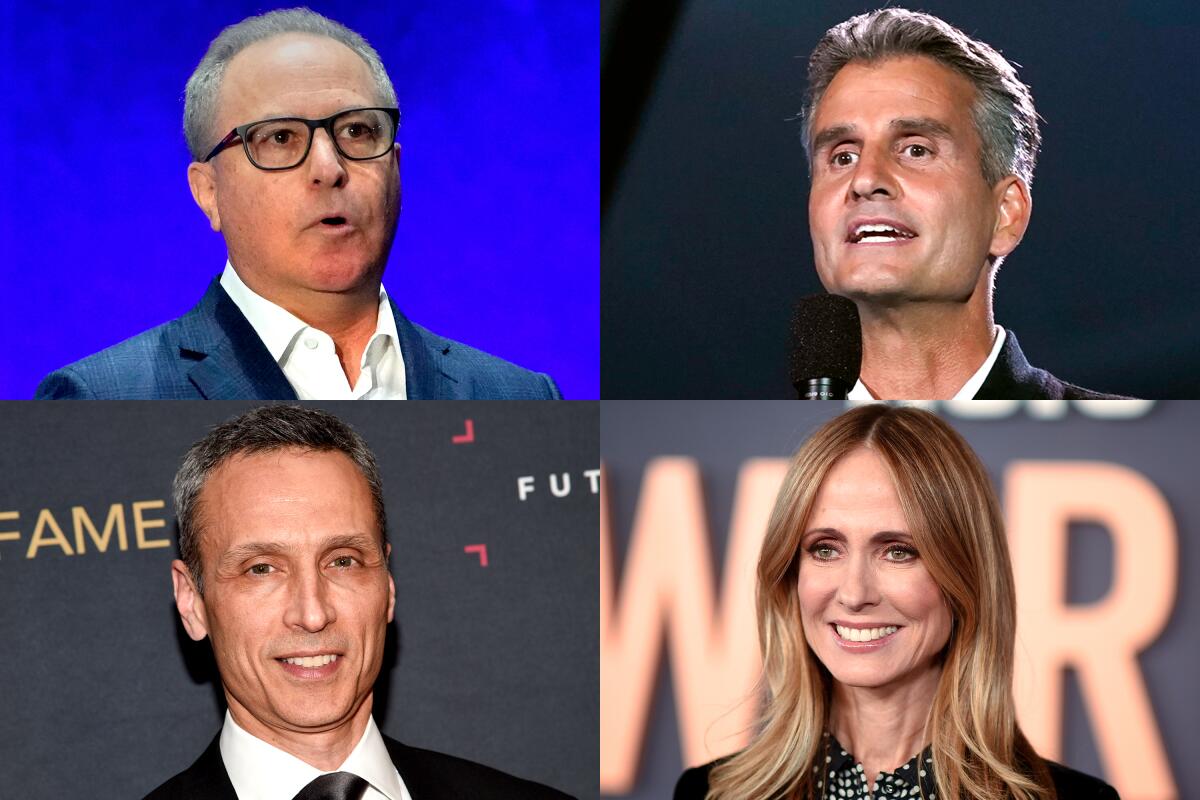
- Share via
Walt Disney Co. Chief Executive Bob Iger has prevailed in the company’s shareholder fight against billionaire dissident Nelson Peltz. But the celebrated executive’s most challenging task still looms: selecting someone to fill his big shoes.
The 73-year-old chief is set to retire in 2026 — assuming he steps down as planned.
For decades, succession planning has been among the Burbank giant’s most vexing issues. During Iger’s first, highly successful 15-year run, he delayed his planned retirement multiple times, and potential successors, including former Chief Operating Officer Tom Staggs, left the company in frustration.
Peltz and others pointed to the bungled hand-off to parks head Bob Chapek as proof that Disney’s board of directors, who oversee the succession process, weren’t up to the job. Chapek’s tumultuous tenure lasted less than three years; Iger returned in late 2022 to replace him.
Peltz’s failed bid to join the board gives Iger and the board some breathing room as they assess candidates to eventually take over the storied company. But shareholders, during the contentious proxy campaign, made it clear that Disney can’t whiff again.
Disney shareholders reject billionaire investor Nelson Peltz, who wanted changes, for a board seat. The hard-fought battle exposed Disney’s challenges.
Succession is “the board’s No. 1 priority,” Iger said Thursday during an appearance on CNBC. Leading the process is Disney Chair Mark Parker. The company’s succession committee also includes General Motors Co. CEO Mary T. Barra, Morgan Stanley Executive Chair James P. Gorman and Calvin R. McDonald, chief of Lululemon Athetica Inc. The group met seven times last year to address succession, Iger said, and they “intend to meet even more this year.”
“They are confident they will choose the right person at the right time. And they have some time to do that,” Iger said. “But again, they’re treating it with a sense of urgency because it is so important.”
Disney historically promotes from within, but board members currently are looking at potential external candidates as well as four top executives: Disney Entertainment co-Chair Dana Walden, who oversees television; fellow entertainment co-Chair Alan Bergman, who runs the film studios (Walden and Bergman share oversight of streaming); parks, products and experiences czar Josh D’Amaro; and ESPN boss James Pitaro.
Corporate bake-offs can be fraught. Passed-over executives often depart, and Disney cannot afford to have an exodus of its top talent at such a crucial moment as it tries to transition its television business to streaming. More than a decade ago, Time Warner lost two key executives when it chose from among a trio of Warner Bros. executives to lead that Burbank studio.
Disney’s leading contenders have their own areas of expertise, as well as blind spots. None has the experience of running a $220-billion, multifaceted media and entertainment empire such as Disney. But then again, neither did Iger before he ascended to the throne in 2005.
Disney executives declined to comment for this story.
Dana Walden, boss of all TV
One of the savviest executives in Hollywood, Dana Walden oversees a vast portfolio of properties and programming crucial to Disney’s legacy TV business and its streaming future. She’s in charge of Disney’s television studios, the ABC network, ABC News, children’s and young adult programming, Freeform, National Geographic, FX, Hulu and Hulu Originals.
Walden arrived at Disney five years ago when the company bought much of Rupert Murdoch’s 21st Century Fox. One of Iger’s motivations for the deal was to boost Disney’s TV executive talent by bringing over successful Fox personnel, including Walden, FX’s John Landgraf and former TV head Peter Rice. The pricey Fox acquisition, while lambasted by Peltz and others, gave Disney a programming arsenal to support its streaming ambitions.
Among the four CEO candidates, Walden may be the most similar to Iger in terms of career trajectory and soft touch with talent. He climbed the rungs of the ABC broadcast network before ascending to Disney’s No. 2 job in 2000. Like Iger, Walden is a skilled manager and polished communicator who instinctively understands creative executives. She has deep relationships with, and the respect of, Hollywood’s producers, writers and other talent. She grew up in Studio City and got her start in television as a publicist (including a stint promoting Arsenio Hall).
Disney’s $71-billion purchase of Rupert Murdoch’s entertainment assets, including ‘The Simpsons,’ ‘Avatar’ and Hulu, has also been a financial burden for the studio, which recently said it would eliminate 7,000 jobs to reduce costs.
Walden’s long collaboration with Ryan Murphy (“Glee,” “American Crime Story” and the “Feud” franchise) has proved beneficial as he now is working more closely with Disney following a stint at Netflix. Walden also was instrumental in bringing the Kardashians to Hulu from their cable home on the E! Channel.
She has presided over a revitalization of Disney’s youth programming after a fallow stretch, with the popular “Percy Jackson & the Olympians” and “Goosebumps” — shows that are core to Disney’s family entertainment brand.
The 59-year-old executive could become Disney’s first female CEO. Perhaps the biggest knock on Walden is that she didn’t come up through Disney’s ranks, leading some in the rank and file to question whether enough Mickey Mouse DNA is present in her cells. She’d also have to overcome the perception that she’s “just” a TV exec. That’s not the case, given her streaming purview.
Alan Bergman, the non-flashy studio chief
At Disney’s core, it all comes back to movies, and it’s been that way since Walt and Roy Disney founded their studio in 1923. To this day, theatrical film drives most other parts of the business, including theme park attractions and toy sales.
As such, entertainment co-Chair Alan Bergman, 58, sits atop an extraordinarily important part of the company, shepherding storied brands including Disney Animation, Pixar, Marvel Studios, Lucasfilm and Searchlight Pictures (known for recent four-time Oscar winner “Poor Things”).
Bergman is a true Disney veteran with a deep and detailed understanding of business and finance, having joined the company in 1996. He was promoted to president of Walt Disney Studios in 2005 and fully took over the division in 2020, succeeding Alan Horn after a period of unprecedented box office success, including hits such as “Avengers: Endgame” and “Star Wars: The Force Awakens.”
He’s not flashy. A UCLA graduate in business economics, Bergman has avoided the spotlight, preferring to let his deputies, such as Marvel’s Kevin Feige and Disney Animation’s Jennifer Lee, take their due credit. Yet he commands the respect of those high-powered creatives and has worked for years with the likes of Peter Jackson, James Cameron and Ryan Coogler.
‘The Marvels’ fell out of the top 10 at the box office after three weekends. The studio has been struggling with quality control, according to some.
Bergman, like his counterparts, has his hands full. Lately, the studios have suffered from a number of high-profile flops, including “The Marvels” and “Haunted Mansion.” Even last year’s “The Little Mermaid,” which was hammered by racist online attacks, struggled to achieve the heights of past remakes from the Disney vault. The studios — particularly Marvel — were stretched painfully thin by a mandate to crank out material for Disney+, and that showed in the waning quality of the superhero franchise.
Efforts are underway to get Disney’s all-important theatrical film business back on track. Iger has allowed his division heads, including Bergman, to slow their output and focus on quality over quantity. This year’s Disney slate includes big franchise extensions: “Inside Out 2,” a “Moana” sequel and “Mufasa: The Lion King.”
Josh D’Amaro, keeper of the Magic Kingdom
To legions of superfans, the charismatic Josh D’Amaro is Mr. Disney. Since joining the company in 1998 in a position at the Disneyland Resort, D’Amaro has steadily climbed the corporate ladder. Under his leadership, the parks have embarked on major capital projects, including new lands such as Star Wars: Galaxy’s Edge and the Avengers Campus.
Today, D’Amaro, 53, serves as chair of Disney Experiences, giving him an expansive portfolio that includes oversight of the company’s theme parks, its famed Imagineering division, Disney’s cruise line and its consumer products (think Baby Yoda dolls and Elsa dresses).
In all, D’Amaro is in charge of 180,000 employees, many of whom are unionized or part time, meaning he’s used to leading large teams and wildly capital-intensive initiatives. The parks are Disney’s biggest profit center, showing he can navigate a massive budget. The “experiences” segment accounted for 60% of Disney’s operating income during the most recent fiscal year. He’s in charge of a roughly $60-billion effort to expand Disney’s parks, a huge bet on live, in-person entertainment.
It’s a challenging, multi-pronged job that comes with hazards. D’Amaro recently had to navigate the fallout over Disney’s nasty feud with Florida Gov. Ron DeSantis over the state’s anti-LGBTQ+ legislation and the former Reedy Creek Improvement District.
Disney and the Central Florida Tourism Oversight District settle a lawsuit over the powers of the special body that controls the land Walt Disney World sits on.
But he’s popular with Disney’s enthusiastic and demanding fans, which helps. Disney guests will often stop him in the parks and ask for selfies, or query him about park design decisions. His presentations at Disney fan convention D23 are always well-attended.
One knock against him is his lack of direct experience with film and TV, as his entire career has been in the experiences sector, particularly the parks. There is recent precedent for a CEO coming out of the parks division, though it didn’t work out so well. After all, D’Amaro ascended to his current position after Chapek was named Disney CEO. But D’Amaro has the kind of Disney spark that Chapek never did.
Jimmy Pitaro, sports supreme
When ESPN Chair Jimmy Pitaro took the reins of the sports cable giant in 2018, he inherited a division beset by shrinking TV ratings while cord-cutting was eroding its ability to reach viewers. ESPN’s hosts were under fire over the political discourse on its talk shows in the wake of President Trump’s 2016 victory.
Pitaro, 54, who previously led Disney’s consumer products and interactive media division, is credited with calming the waters and preparing the network for the future by increasing its digital prowess and growing its social media presence to keep it relevant with younger viewers.
To further that aim, he’s overseeing the launch of ESPN’s long-awaited direct-to-consumer product, which by the fall of 2025 will give consumers access to its full suite of channels, including the flagship ESPN. Ratings at the ESPN cable channel have improved, despite dramatic declines in pay-TV subscriptions.
Pitaro is also credited with repairing ESPN’s relationship with the NFL (whose games are America’s most-watched TV programming), helping to pave the way for a new 11-year media rights deal with the league that gives the company two Super Bowls that will air on Disney’s ABC broadcast network. ESPN has also secured the media rights to its major live events for the rest of the decade, with only the NBA contract — up in 2025 — remaining as its next major test.
There are actually things to talk about in Hollywood other than the WGA and SAG-AFTRA strikes — such as the Disney-Charter deal to end the blackout.
That said, sports is a smaller segment within Disney than either entertainment or parks in terms of revenue. It wasn’t long ago that analysts wondered if ESPN would even be part of Disney’s empire for the long term. When Iger seemed to muse aloud about spinning off ESPN, though, Pitaro was said to be a good soldier and didn’t complain.
The idea of cleaving ESPN from Disney no longer appears to be under serious consideration. Iger has begun touting the unit’s strong financial performance again. Though Pitaro is well-liked within the company, he’d be a novice in the Hollywood side of the business. But he’s comfortable with show business types. His wife, Jean Louisa Kelly, is a veteran film actress.
More to Read
Inside the business of entertainment
The Wide Shot brings you news, analysis and insights on everything from streaming wars to production — and what it all means for the future.
You may occasionally receive promotional content from the Los Angeles Times.

